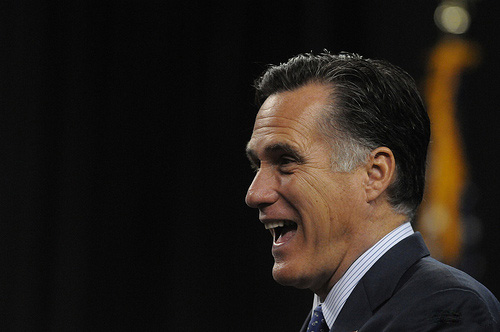President Obama promised to begin to slow the rise of the oceans and to heal the planet. MY promise … is to help you and your family.
This was one of the key points Mitt Romney made in the speech he gave Thursday night to officially accept the presidential nomination of the Republican Party. This was the speech immediately before the balloon drop, his primary sales pitch to undecided voters who hadn’t yet made up their minds. The quote was one of a few key passages Romney released to the press beforehand — one of the points the campaign thought were most important to get into newspaper articles before papers went to print.
The quote Romney references here is from a speech Obama gave on June 3, 2008, the night he wrapped up the nomination for the Democratic Party. In context, it reads like this.
The journey will be difficult. The road will be long. I face this challenge with profound humility, and knowledge of my own limitations. But I also face it with limitless faith in the capacity of the American people. Because if we are willing to work for it, and fight for it, and believe in it, then I am absolutely certain that generations from now, we will be able to look back and tell our children that this was the moment when we began to provide care for the sick and good jobs to the jobless; this was the moment when the rise of the oceans began to slow and our planet began to heal; this was the moment when we ended a war and secured our nation and restored our image as the last, best hope on Earth. This was the moment — this was the time — when we came together to remake this great nation so that it may always reflect our very best selves, and our highest ideals.
Obama’s point, of course, was that he’d been endorsed to fight for what the Democratic Party believes in: a strong safety net, employment, addressing climate change, ending the war in Iraq, burnishing an image of the United States that had been gutted by the man then holding the office. In the past four years, he clearly hasn’t accomplished all of that; on many points, he’s fallen much shorter than Democrats had hoped. But this was a statement of intent, an exhortation to ideals.
As soon as he gave the speech, the section about the ocean became a symbol for an opposition intent to portray Obama as an effete other. The next day, the clip was posted on YouTube, with the title “Obama Promises The World.” When you search for that phrase on Google during the latter part of 2008, the first site that returns a result is “ObamaMessiah.blogspot.com.” Obama’s claim that we might address the rise of the oceans was seen as a man claiming dominion over the universe, not as a sensible priority for a president in the year 2008.
That year, Mitt Romney was also running for president, though his campaign had ended by the time Obama gave that speech. During that campaign in 2008, Romney admitted that climate change was occurring, and that humans were contributing to it. But Romney lost.
So now, Mitt Romney derides the scientific fact of climate change as he finds better political success in the Republican primary. And he has embraced the support of those who wrung from Obama’s hopeful, excited words such bizarre insinuations.
What Romney argues is a classic false choice: the idea that we must either choose to save the environment or put people to work. It’s the sort of argument that lets polluters squat in poor communities, insisting that they be allowed to do as they wish or they’ll take their jobs elsewhere. It’s a choice that need not be made, as demonstrated by green jobs and the burgeoning industries built around renewables and efficiency and sustainability.
But that’s not actually what Romney was arguing. He was arguing that Obama is a weirdo who cares more about dolphins than Americans. That Romney will be there for the kids after school with a Wonder bread sandwich while Obama is nursing a spotted owl back to health with his halo.
This election will be close and fiercely fought. Romney’s comment wasn’t about an issue of substance. It was about stroking the elements of the population who would be least likely to help him accomplish his goals were he to be elected to office. It was about making an earnest claim from a political candidate into a cynical joke — about diminishing a critical problem in order to add another two points to the scoreboard.
That’s a terrible precedent for a candidate who might someday need to defend his office. Even more, it’s a horrendous idea for a man who would need, if elected, to lead a nation that must prepare for the most disruptive transition in its history.
that climate change laugh line is going to be in every documentary from the latter half of the 21st century
— Matt Novak (@paleofuture) August 31, 2012




